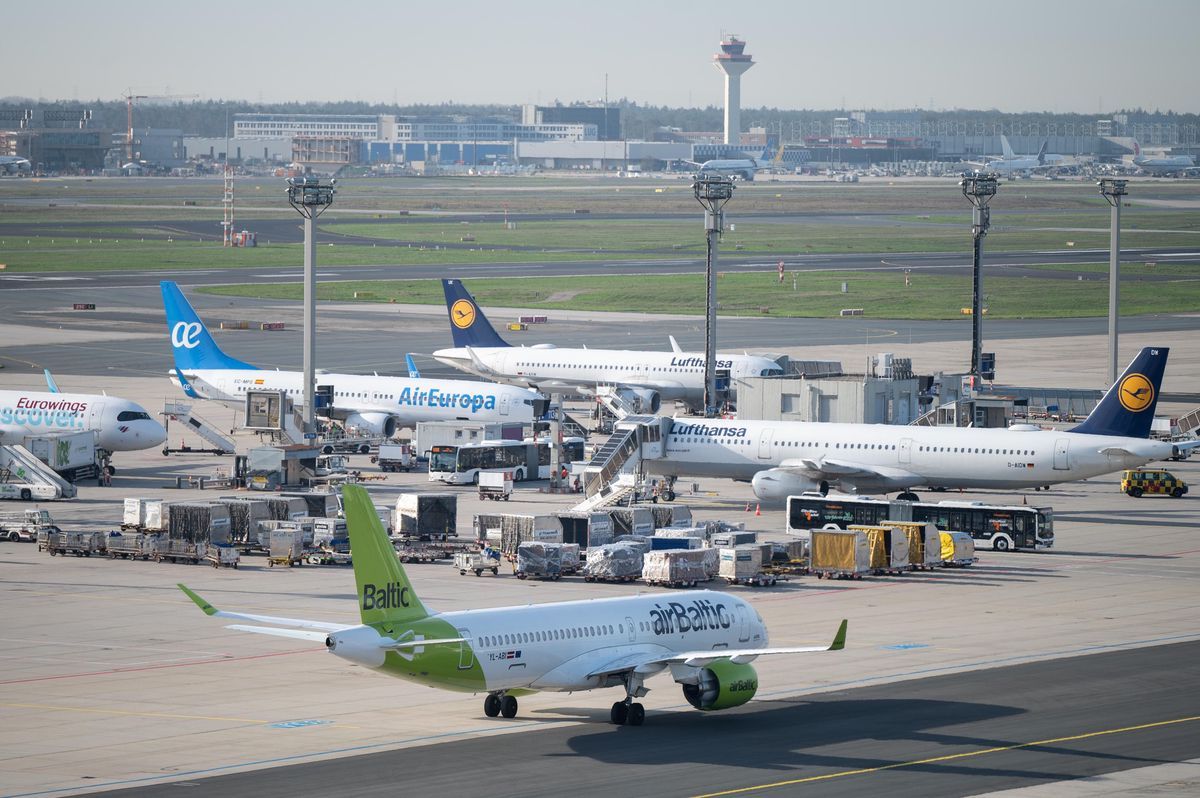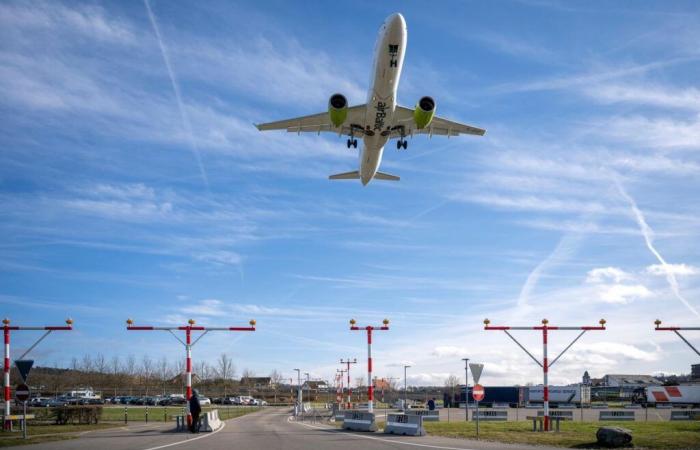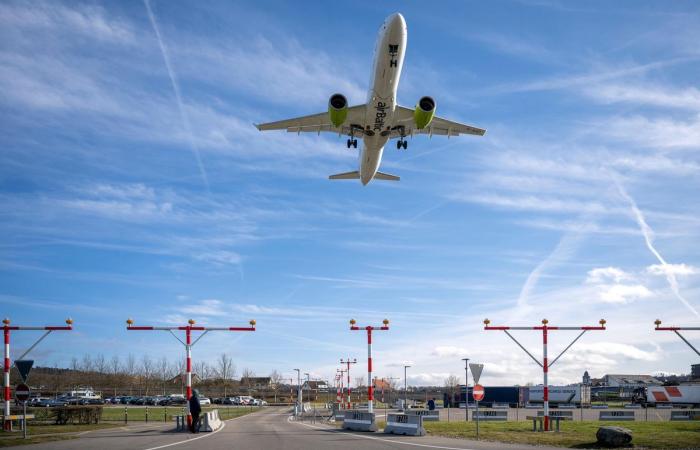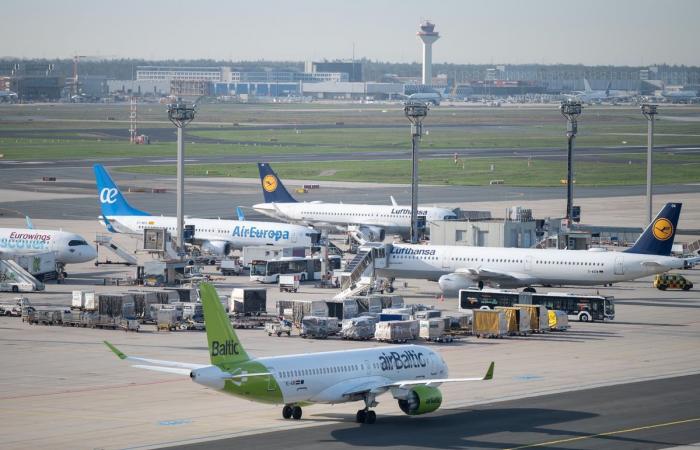Contract with Air Baltic –
Low-cost crews fly for Swiss despite opposition from the Confederation
For two years, the Swiss airline has been leasing Latvian planes and personnel. Since then, a legal battle has raged behind the scenes.
Published today at 6:34 p.m.
Controversial in many ways, an Air Baltic Airbus A220 lands in Zurich.
URS JAUDAS/TAMEDIA
Subscribe now and enjoy the audio playback feature.
BotTalk
- In 2023, Swiss achieved a record profit of 718 million francs.
- Air Baltic leases planes and crews to Swiss in «wet lease».
- Authorities are investigating allegations of wage dumping against Air Baltic in Switzerland.
- Despite the legal procedures, Swiss plans to continue using Air Baltic planes.
Swiss is once again a cash machine. In 2023, the Swiss airline, owned by the German group Lufthansa, achieved the highest profit in its more than twenty years of history, i.e. 718 million francs. On Tuesday, it announced a profit of 505 million francs for the first nine months of the year. It has thus more than compensated for the losses of the years of pandemic.
But did the company reap its profits at the expense of cheap crews from Eastern Europe? Authorities have been looking into the issue for more than two years. The answer is not clear.
The Latvian company Air Baltic is at the heart of the affair. For two years, it has rented its planes and crews, that is to say its pilots and cabin crew, to Swiss. In aviation, this is called a «wet lease»a sort of charter. Air Baltic takes care of flights to and from Zurich for Swiss and remains, decisively, the employer of the staff. The Latvian crews’ missions last a few days and include overnight stays in Zurich and other destinations offered by Swiss.
Air Baltic also intervenes for engine problems
For many passengers, the situation is exasperating, even a source of irritation. They book with Swiss, but then travel on a green and white Air Baltic plane. Most of the time, crews do not master the Swiss national language. But the truth is that Swiss has been carrying out this type of flight for many years wet leasewith the help of Helvetic Airways, the company of Schwyz billionaire Martin Ebner. However, many employees there speak German and, as at Swiss, a Swiss cross appears on the tail of the device.
Swiss exploits partnerships wet lease to “flexibly cover seasonal fluctuations or production bottlenecks and thus offer its passengers a reliable flight schedule”. The company defends itself against allegations of salary dumping made by the media or unions. The use of Air Baltic is “not a strategic decision to relocate production […] or reduce costs […]», Testifies one of the spokespersons. “Swiss would prefer to operate these flights itself.” But it failed to do so for various reasons, including engine problems in its own fleet.
Despite these claims, salaries are the main point of contention. Air Baltic pays its crew members a minimum income equivalent to around 1,500 francs gross. At Swiss, the starting salary is around 4,000 francs. An Air Baltic co-pilot receives 4,000 francs for the first year of service. At Swiss, this amount is more than 7,000 francs.
The canton of Zurich is harsh
When a foreign construction company has a contract in Switzerland, it must ensure that its workers receive the same salary as if they were employed in Switzerland. This is what we call the posting of workers. The law on this subject is part of the accompanying measures with which Switzerland protects its labor market against wage dumping and which were introduced in the context of the free movement of people with the EU.
This equal treatment does not exist in the case of wet lease of Air Baltic. After the announcement by Swiss, in August 2022, of the charter of at least six Air Baltic planes, the cabin crew union Kapers and its Latvian counterpart addressed the Swiss authorities.
Initially, the Office for Economics and Labor of the Canton of Zurich, headed by Director of Economic Affairs Carmen Walker Späh (PLR), even described the operation as a prohibited provision of personnel. Or how to end the process in the blink of an eye. The Canton of Zurich is responsible in this matter because Swiss has its headquarters in Kloten.
The Confederation, specifically the State Secretariat for Economic Affairs (SECO), corrected this decision in spring 2023, putting forward the principle of posted workers. If permitted, the corresponding rules must be respected. In addition to the postulate “equal pay for equal work”, this implies the obligation to declare the activity or obtain authorization from the authorities if the duration of the activity exceeds 90 days. In autumn 2023, SECO commissioned the Canton of Zurich to carry out an evaluation.

Air Baltic and Lufthansa planes on the tarmac at Frankfurt Airport. An increasingly close collaboration. Towards the same group?
SEBASTIAN GOLLNOW/DPA/KEYSTONE
What has happened since is unclear. Zurich’s public economy department responded to repeated media inquiries in recent months by saying that it could “not provide any information due to the ongoing appeal procedure. It requires clarification in an international context. This takes time and requires the parties concerned to be heard, with appropriate avenues of appeal.” On the part of Air Baltic, officially the opposing party in the procedure, we do not know much. The only element it mentions is that it complies with labor laws.
Given the limited information available, the following scenario is likely. Last autumn, the Zurich authorities intended to take the necessary steps to evaluate the principle of secondment. In this specific context, they would have given the mandate to the tripartite commission to set a customary salary in the country for the activities concerned. Air Baltic would then be required to do so. The tripartite commission is made up of representatives of employers, workers and the Canton.
According to experts, a retroactive application of these salary guidelines would be realistic, so that Air Baltic would have to pay salary arrears to its employees. This could amount to millions of francs. In addition, a fine for violation of the law on posted workers would be possible. The duration of the procedure and the positions taken indicate that Air Baltic is defending itself against the expertise before the Canton’s appeal body. It would then be possible to take the case to the Zurich Administrative Court, or even to the Federal Court.
Air Baltic needs money
Swiss emphasizes that it is not part of the procedure. She has “no power in matters of labor law with Air Baltic employees”, she highlighted several times in a press release. “It’s Air Baltic’s business.” It is not specified whether a decision by the authorities or a court could have financial repercussions on the company.
Swiss also writes that it does not advise Air Baltic on legal matters. But it is clear that she is actively committed to her Latvian partner. According to a press release from the Canton of Zurich, the Swiss airline objected to SECO’s assessment that this was indeed a secondment of personnel at a round table last year. “As far as the organization of Air Baltic is concerned, the missions of its employees start and stop in Riga,” explains Swiss to justify his point of view. SECO does not want to take a public position and explain how it arrived at the opposite point of view.
It is difficult to judge from the outside how much longer the procedure could last. At least until next summer, Swiss will continue to fly six Air Baltic aircraft. In addition, Swiss’ parent company, Lufthansa, extended its partnership in September wet lease with the Latvians until 2028. We can assume that Swiss could resort to this. In October, she announced a further five-year extension of her contract with Helvetic.
All this goes against the objective formulated last March by the Swiss head of operations Oliver Buchhofer, during an interview he gave us. “It is obvious that we want to reduce wet leasing in the future,” he argued.
For Air Baltic, on the other hand, the wet lease represents a significant contribution to its financial stability. Unlike Swiss, the company is in the red. Until now, it has been the Latvian state, which holds almost 100% of the shares, which has kept it afloat. However, according to recent press articles, Lufthansa, the parent company of Swiss, is seeking to acquire 10% of the company. The companies have not yet commented on the subject.
“Latest news”
Want to stay on top of the news? “Tribune de Genève” offers you two meetings per day, directly in your email box. So you don’t miss anything that’s happening in your canton, in Switzerland or around the world.
Other newsletters
Log in
Did you find an error? Please report it to us.
2 comments








